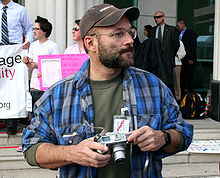Queer studies, sexual diversity studies, or LGBTQ studies is the study of topics relating to sexual orientation and gender identity usually focusing on lesbian, gay, bisexual, transgender, gender dysphoric, asexual, aromantic, queer, questioning, and intersex people and cultures.
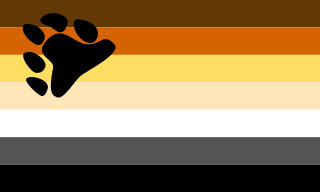
In gay culture, a bear is a man who is fat, hairy, or both.

Biphobia is aversion toward bisexuality or people who are identified or perceived as being bisexual. Similarly to homophobia, it refers to hatred and prejudice specifically against those identified or perceived as being in the bisexual community. It can take the form of denial that bisexuality is a genuine sexual orientation, or of negative stereotypes about people who are bisexual. Other forms of biphobia include bisexual erasure.

Michelangelo Signorile is an American journalist, author and talk radio host. His radio program is aired each weekday across the United States and Canada on Sirius XM Radio and globally online. Signorile was editor-at-large for HuffPost from 2011 until 2019. Signorile is a political liberal, and covers a wide variety of political and cultural issues.
LGBTQ slang, LGBTQ speak, queer slang, or gay slang is a set of English slang lexicon used predominantly among LGBTQ+ people. It has been used in various languages since the early 20th century as a means by which members of the LGBTQ+ community identify themselves and speak in code with brevity and speed to others. The acronym LGBT was popularized in the 1990s and stands for Lesbian, Gay, Bisexual, and Transgender. It may refer to anyone who is non-heterosexual or non-cisgender, instead of exclusively to people who are lesbian, gay, bisexual, or transgender. To recognize this inclusion, a popular variant, LGBTQ, adds the letter Q for those who identify as queer or are questioning their sexual or gender identity.

Curve is a global lesbian media project. It covers news, politics, social issues, and includes celebrity interviews and stories on entertainment, pop culture, style, and travel.
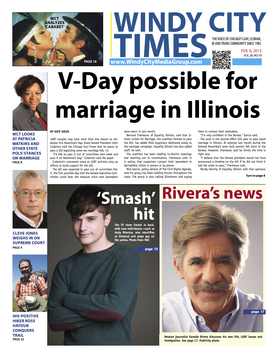
Windy City Times is an LGBT newspaper in Chicago that published its first issue on September 26, 1985.

LGBT stereotypes are stereotypes about lesbian, gay, bisexual and transgender (LGBTQ) people based on their sexual orientations, gender identities, or gender expressions. Stereotypical perceptions may be acquired through interactions with parents, teachers, peers and mass media, or, more generally, through a lack of firsthand familiarity, resulting in an increased reliance on generalizations.
Gay is a term that primarily refers to a homosexual person or the trait of being homosexual. The term originally meant 'carefree', 'cheerful', or 'bright and showy'.
Rites was a Canadian magazine, published for gay, lesbian, bisexual, and transgender communities in Canada from 1984 to 1992.
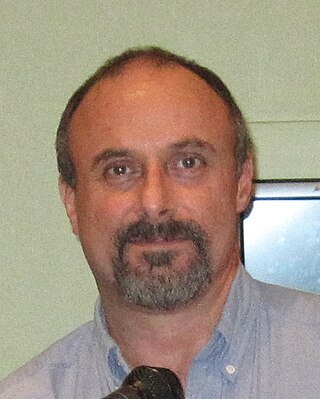
Ron Jackson Suresha is an American author and editor of books centering on gay and bisexual men's subcultures, particularly the Bear community.
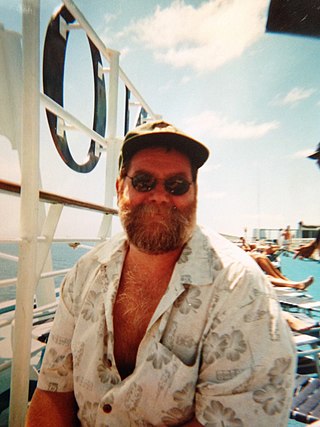
Edmund Christian Nelson was an American photographer and co-founder of Bear Magazine in the 1980s, was the photographic pioneer in the gay-oriented erotic photography of mature men with hairy bodies and facial hair. His work directly led to the legitimizing of the bear community as a social group.

The International Bear Brotherhood Flag, also known as the bear flag, is a pride flag designed to represent the bear subculture within the LGBTQIA+ community. The colors of the flag—dark brown, orange/rust, golden yellow, tan, white, gray, and black—symbolize species of animal bears throughout the world. Though not necessarily referring to human skin color or hair color, the flag was designed with inclusion in mind. The bear culture celebrates secondary sex characteristics such as growth of body hair and facial hair, traits associated with bears.
Lawrence D. Mass is an American physician and writer. A co-founder of Gay Men's Health Crisis, he wrote the first press reports in the United States on an illness later became known as AIDS. He is the author of numerous publications on HIV, hepatitis C, STDs, gay health, psychiatry and sex research, and on music, opera, and culture. He is also the author/editor of four books/collections. In 2009 he was in the first group of physicians to be designated as diplomates of the American Board of Addiction Medicine. Since 1979, he has lived and worked as a physician in New York City, where he resided with his life partner, writer and activist Arnie Kantrowitz. Having written for the New York Native since the 1970s, he currently writes a column for The Huffington Post. An archival collection of his papers are at the New York Public Library.

John Joseph "Jack" Fritscher is an American author, university professor, historian, and social activist known internationally for his fiction, erotica, and nonfiction analyses of pop culture and gay male culture. An activist prior to the Stonewall riots, he was an out and founding member of the Journal of Popular Culture. Fritscher became highly influential as editor of Drummer magazine.
William Leap is an emeritus professor of anthropology at American University and an affiliate professor in the Women's, Gender and Sexuality Studies Program at Florida Atlantic University. He works in the overlapping fields of language and sexuality studies and queer linguistics, and queer historical linguistics.

The first English-language use of the word "bisexual" to refer to sexual orientation occurred in 1892.
Gender roles in non-heterosexual communities are a topic of much debate; some people believe traditional, heterosexual gender roles are often erroneously enforced on non-heterosexual relationships by means of heteronormative culture and attitudes towards these non-conformative relationships.
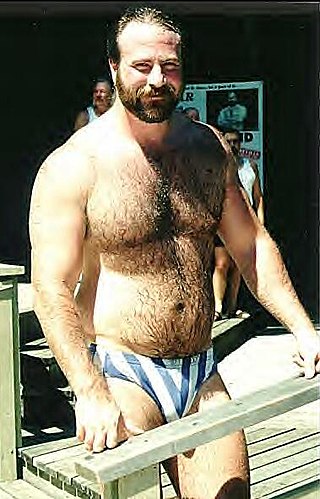
Jack Radcliffe is an American former pornographic film actor. Radcliffe is considered a pornographic icon, and in particular, an icon of gay bear subculture and its physical aesthetics.
